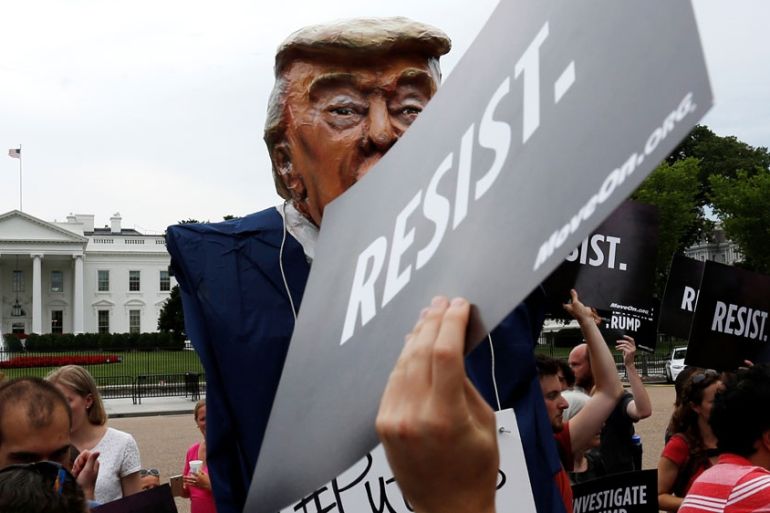Katie Yow refuses to testify amid activist ‘witch hunt’
North Carolina social worker and anarchist risks jail by not complying with order to attend federal grand jury.

An activist in the US state of North Carolina could face up to 18 months in jail for refusing to testify before a federal grand jury over the firebombing of a Republican Party office during the 2016 presidential election.
Katie Yow, a 31-year-old anarchist and social worker, decried the order, arguing that the secretive nature of grand juries enables the government to target activists without accountability.
Keep reading
list of 4 itemsWhat happens when activists are branded ‘terrorists’ in the Philippines?
Are settler politics running unchecked in Israel?
Post-1948 order ‘at risk of decimation’ amid war in Gaza, Ukraine: Amnesty
|
|
Because witnesses’ lawyers are not allowed in grand jury testimony sessions, Yow’s supporters accuse the government of using the subpoena to intimidate activists and gather information on protest movements.
Their fears come at a time when hundreds of anti-Trump protesters are facing felony charges nationwide.
On Monday, dozens of supporters rallied outside the US Middle District Court while Yow was inside.
She later emerged and informed the crowd that a hearing over her fate had been scheduled for a later date.
Kris Hermes, an activist and legal worker affiliated with the Grand Jury Resistance Project, said the use of grand juries by the state occurs “in waves”.
“It’s a tool that becomes used by the state when political movements are gaining traction,” he told Al Jazeera.
‘I will never comply with this’
A grand jury is different from a trial jury in the US justice system because they are used to assist a prosecutor in deciding whether or not to bring criminal charges against an individual during an investigation.
With no judge present and no legal defence lawyer for the witness, the prosecutor explains the law to the jurors, decides what type of evidence jurors see and can effectively interrogate any witness they like.
Grand jury members and the prosecutor are also barred from revealing what took place during the hearing.
However, there are legal repercussions for refusing to appear, including being jailed for the duration of the grand jury, which can span up to 18 months.
READ MORE: Reporters face 70 years in prison over anti-Trump march
In October 2016, less than a month before the presidential elections, a firebomb was thrown through the window of the local Republican Party headquarters in Hillsborough, North Carolina, badly damaging the building.
“While many things about what will happen next are developing and uncertain, one thing is absolutely clear: I will never comply with this or any subpoena,” Yow said in a statement released after she received the order on July 10.
“I am resisting this grand jury with the considerable support and wisdom of many people who work every day to combat state repression,” she added.
“I am resisting this grand jury in solidarity with all those resisting the unforgivable daily violence of the state.”
‘Witch hunt’
Jude Ortiz, a friend and supporter of Yow, told Al Jazeera that he feared the consequences of the activist’s actions.
“[Another friend] I supported was locked up for four months on civil contempt of court for refusing to testify until she was suddenly released, without explanation,” he said.
Ortiz argued that grand jury subpoenas could be part of a “witch hunt”, citing a crackdown on anti-Trump activists and a wave of bills introduced in state legislatures that could severely limit protesters’ actions.
Last year, as thousands of people rallied in Standing Rock, North Dakota, during the standoff over the Dakota Access Pipeline, a grand jury was convened to investigate events during the protest movement.
In 2010, subpoenas were issued to 23 international activists with the Freedom Road Socialist Organization (FRSO), a nonviolent group, in Chicago. They were summoned to a federal grand jury during an investigation of “material support of terror”.
READ MORE: US police arrest left-wing protesters as far-right rallies
The FRSO members were planning trips to support Palestinian and Colombian political movements. They refused to cooperate with the grand jury, citing political oppression. While no charges have been made, it is unclear whether the investigation has ended.
More than 200 activists are currently facing 70 to 80 years in prison for protesting against Trump’s inauguration on January 20 in Washington, DC, a move many view as an example of increased political pressure on anti-Trump activists.
Antiracist activists in Virginia have also accused police of a crackdown on their communities as far-right movements are allowed to organise and rally.
The Guilford County District Attorney’s Office could not be reached for a comment.
Ortiz said that he and members of the anarchist movement across the country plan to support Yow until “the end”.
Follow Creede Newton on Twitter: @CreedeNewton
|
|